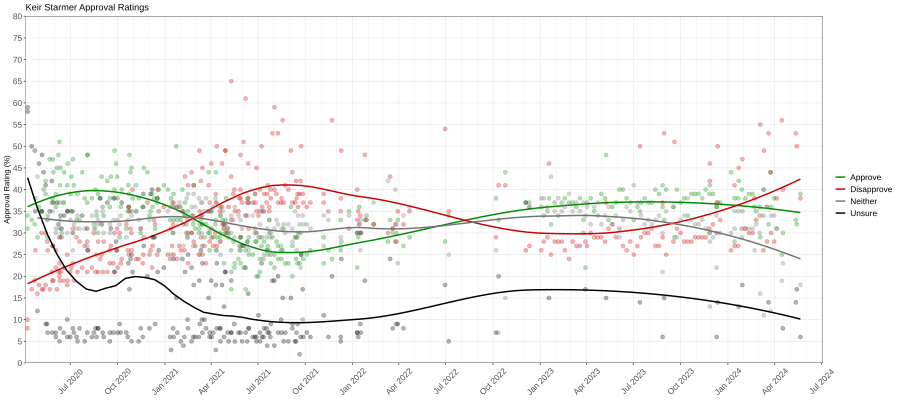July 4, 2024
UK Elections
With all the Tory news organizations backing Labour for the first time since Blair, watching the results of the coming elections is really a matter of counting how many seats the Tories lose.
The question for us is how a massive Labour government will behave? The media is awash with analyses of the cunning and ruthlessness which got Labour into this position, but it is not clear to me that these are correct in the slightest.
It seems like a wasted opportunity for Labour as an ideological party – which it is. It might not always be a left-wing ideological party, but British politics is driven by egos and policy discussions like everywhere else.
One thing is clear: There isn't going to be Socialism by Surprise. The policy program is overwhelmingly centrist-liberal in its economics with a splash of soft social conservatism.
Did labour need to go all-in on a pro-corporate agenda to win? It seems very unlikely. Then the question becomes, why is Labour holding so firmly to this orientation to the economy and to the population generally?
The policy papers put out by Labour Together (the anti-left policy group backing Starmer) paint the picture of a party trying desperately to convince itself that it is serious. Serious about being serious. Serious about not wanting to upset capital and wanting to win back the Stevenage Woman—a strange (and frankly insulting) term that Labour Together uses to describe a slightly conservative professional woman in mid-sized suburban England. Women who work in corporate banking and ad firms, who were apparently lost in the previous elections since Blair.
The term "working class" does not appear in the policy documents, but the term "Securonomics" does. That tells you who is really running the show.
Labour has become similar to many social democratic parties that turned to the centre to get elected. They become organs of the corporate advertising industry, so disconnected from their base that they produce an odd rhetoric that no one is really meant to understand. Policy papers become full of garbled, meaningless corporate consultant language packaged in nice looking fonts and balanced colours.
As with all corporate advertising, the game is played the same way. You only notice the ads attached to winning brands even though the same firms also made the ads for the losing ones.
Many articles will be published on how complete the Labour victory will be. Morgan McSweeney and his ruthless apolitical data crunching will be highlighted, even though he has very little to do with the victory, except for mobilizing the forces of darkness against the left in the Party.
Remember: It will be a hollow victory. Starmer's personal approval rating is low across the board. This is extremely odd for a party that is winning by such a huge margin, and speaks to the fact that Labour is not really winning; rather, it is the Tories who have lost so badly that any alternative will do.

Capital has won the day against the left of the Party, as the left was more disorganized than it seemed, and only accidentally successful for a short time. Corbyn's left was then crushed by the most obvious of coordinated attacks, including betrayal by the Party's Blairite internal bureaucracy.
The attacks will come again and more quickly than Labour members realize. Even with the Tory news companies backing a pause on a Tory government, their ideology has not changed. Articles are already giving direction to Labour to prioritize growth over redistribution and to "keep centre", "make hard choices", and impose less progressive taxes to fix the budget.
The question for the people of the UK will be, do they allow a Labour government impose the will of capital, like increasing the retirement age, sustained deregulation, profit subsidies, and corporate bailouts? Or do they mobilize and attempt to stop the Labour Party from sliding all the way over to the right?
There are plenty of areas to push on. Industrial strategy is one important policy program outlined in Labour's platform that can be either corporate or socially oriented. Either the program builds an economy of production, or it is used as a corporate profit subsidy. There are plenty of opportunities here as many privatized water, rail, and energy companies are not-so-slowly failing.
The second question is, how will the left respond? Trade unions, student organizations, climate activists, and socialists will have opportunities to outline the alternatives. War, climate change, and aging infrastructure are problems that need solutions. In the face of a rising far right across the rest of Western world, the working class in Britain must mobilize, reach out to the left globally, and together push for an alternative. Not to do so is to succumb to the apparent inevitability of capitalist war.